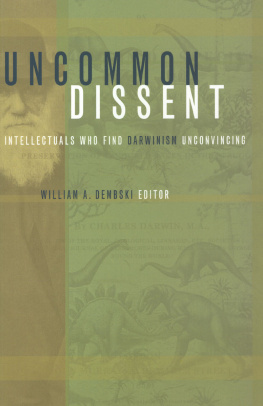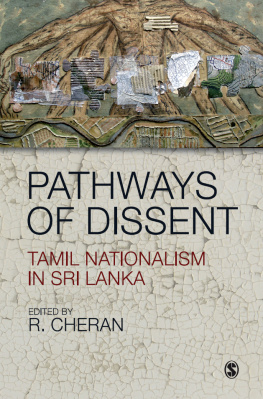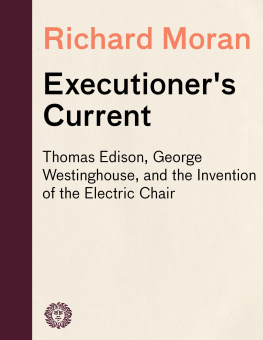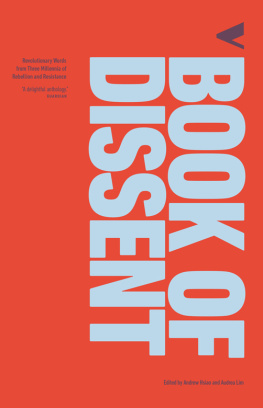Richard George - An Armchair of Dissent
Here you can read online Richard George - An Armchair of Dissent full text of the book (entire story) in english for free. Download pdf and epub, get meaning, cover and reviews about this ebook. year: 2018, publisher: Austin Macauley, genre: Non-fiction / History. Description of the work, (preface) as well as reviews are available. Best literature library LitArk.com created for fans of good reading and offers a wide selection of genres:
Romance novel
Science fiction
Adventure
Detective
Science
History
Home and family
Prose
Art
Politics
Computer
Non-fiction
Religion
Business
Children
Humor
Choose a favorite category and find really read worthwhile books. Enjoy immersion in the world of imagination, feel the emotions of the characters or learn something new for yourself, make an fascinating discovery.

- Book:An Armchair of Dissent
- Author:
- Publisher:Austin Macauley
- Genre:
- Year:2018
- Rating:4 / 5
- Favourites:Add to favourites
- Your mark:
- 80
- 1
- 2
- 3
- 4
- 5
An Armchair of Dissent: summary, description and annotation
We offer to read an annotation, description, summary or preface (depends on what the author of the book "An Armchair of Dissent" wrote himself). If you haven't found the necessary information about the book — write in the comments, we will try to find it.
An Armchair of Dissent — read online for free the complete book (whole text) full work
Below is the text of the book, divided by pages. System saving the place of the last page read, allows you to conveniently read the book "An Armchair of Dissent" online for free, without having to search again every time where you left off. Put a bookmark, and you can go to the page where you finished reading at any time.
Font size:
Interval:
Bookmark:
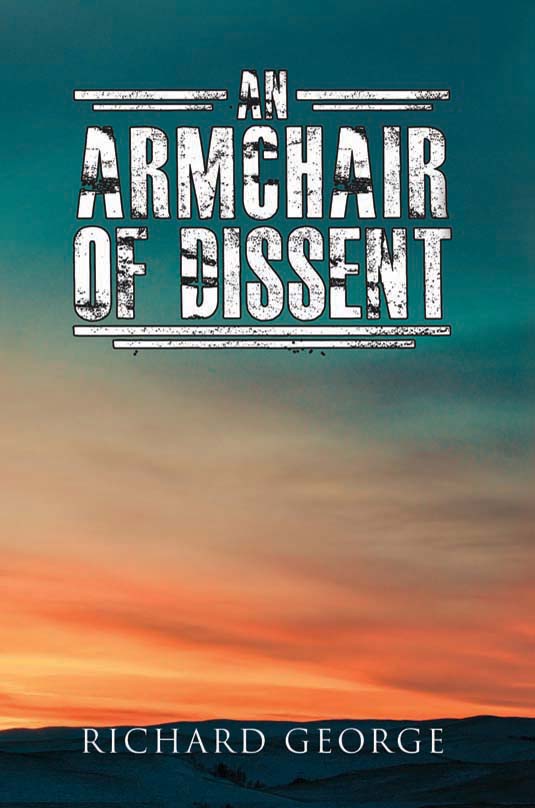
Richard George
Austin Macauley Publishers
2018-08-31
Richard found the courage to start writing at 66 years of age. For 13 years he was increasingly forced into living in his head by the progressive disabling of his body by Motor Neurone Disease. The upside of this was the time to indulge his love of British history and historical fiction. His very ordinary life as a UK citizen of entirely English stock has been characterised by his dissent from the established versions of the history he taught and the views and attitudes he has been expected to promote as a white middle-class male of a certain age.
I should say how proud I am of myself, my origins, my existence as a White, Anglo-Saxon, English, British, Christian, Anglican middle-class male of a certain age but I cannot.
This book is a journey into my past, Britains past, by someonemewho is profoundly uncomfortable with it and with the present in which it has resulted. It is selective, quirky and ordinary, using information openly available to anyone via the internet. It reveals a story of the triumph of arrogant superiority and brutal expediency in defence of a morally indefensible regime of minority domination. Its realities have been fictionalised into a tale of institutionalised glory and civilised advance of human society that denies the frailty of the human psyche and the deadly savagery, self-seeking greed and single-minded pursuit of power that is my inheritance.
To my wife, family and friends; to Professor Pam Shaw, a remarkable expert, educator and Consultant, and her team at Royal Hallamshire; to the Royal Derby Hospital and to Dr. Paul Wood and my local GP Practice. A huge thank you to you all for keeping this increasingly dysfunctional vessel afloat. The dead can speak but they cannot write.
Copyright Richard George (2018)
The right of Richard George to be identified as author of this work has been asserted by him in accordance with section 77 and 78 of the Copyright, Designs and Patents Act 1988.
All rights reserved. No part of this publication may be reproduced, stored in a retrieval system, or transmitted in any form or by any means, electronic, mechanical, photocopying, recording, or otherwise, without the prior permission of the publishers.
Any person who commits any unauthorised act in relation to this publication may be liable to criminal prosecution and civil claims for damages.
A CIP catalogue record for this title is available from the British Library.
ISBN 9781788483810 (Paperback)
ISBN 9781788483827(Hardback)
ISBN 9781788483834(E-Book)
www.austinmacauley.com
First Published (2018)
Austin Macauley Publishers Ltd.TM
25 Canada Square
Canary Wharf
London
E14 5LQ
I owe an enormous debt to Wikipedia for providing the knowledge without which the intention of this book would fail and its content would be somewhat lacking.
Supporters of Wikipedia cite a 2005 survey of Wikipedia published in Nature based on a comparison of 42 science articles with Encyclopdia Britannica, which found that Wikipedias level of accuracy approached Encyclopdia Britannicas. Criticisms of Wikipedia include claims that it exhibits systemic bias, presents a mixture of truths, half truths, and some falsehoods, and is subject to manipulation and spin.
I am a person who is unhappy with things as they stand. We cannot accept the world as it is. Each day we should wake up foaming at the mouth because of the injustice of things.
Hugo Claus
Where is home? All of a sudden, I had a kind of breakthrough. I felt myself fall away, and I became one with the cosmos, one with the universe, one with all things. I knew in that moment that wherever I am, that is home; home is everywhere.
Dennis Merzel
If this book ever reaches an intellectual height more than that of a dinner conversation among reasonably mature, informed, articulate friends or a round-table or bar-stool-linear chat over a pint or a Pimms, then it will fail. If I had any pretension to intellectual debate, spiritual insight or political conviction, I would not be writing it. Nevertheless, I invite those who do to read it. I am not an interpreter of truth or a revealer of the mysteries of the universe. I am more of a disciple of idiom, a purveyor of clichs. To define such expressions of human feeling and experience as overused smacks of some fear of the relevance of them, not to the meaning of life, maybe, but to its morality, how we might best conduct it. We are all part of Gods creation. You only have one life. Love your neighbour. Do unto others as you would have them do unto you. Practice what you preach. Are they too simple to be of use? Are they too right? Are they discredited by elites because they express the social expectations of the ordinary person? This book is my design, my compilation of the words of others, of facts readily accessible to anyone who cares to Google them. For me, it was a voyage of discovery as any good conversation should be. It rambles and digresses but, I hope, it goes somewhere. Any questions that it asks, any challenges that it throws up are there in one form or other in any social group anywhere on this planet. Please join me on my winding journey through time and place and share my love of history too. This journey is also the story of my life, the factual details of which are no more interesting than any other of the billions that this planet has witnessed and no more universally significant. We all share this miraculous being, existing, experiencing, sensing, emoting moment in time and wonder at its meaning. I have found my answers in the lives of others, extraordinary lives that have not only elucidated the insignificance of my own moment in time but the gloriously significant possibilities for which every human being is created.
I grew up in the 1950s and those of you in your sixties or seventies will remember, every 24 May, celebrating Empire Day, learning the history of Britain via its heroes, Drake, Marlborough, Clive, Wolfe, Nelson, Wellington, Gordon, Rhodes and Churchill and imbibing and memorising the geography of the world made flat by the barely-discernible map on the wall, the most obvious feature of which was the ubiquity and dominance of its pinkness. My favourite book was Kiplings Just So Stories and my favourite poem, If, by the same author. I voraciously gobbled up stories of the all-conquering British defeating the French, Spanish, French again, Russians, Turks, Indians, Zulus, Boers and, of course, Germans. Agincourt, the Armada, the Year of Victories (1759), Trafalgar, Waterloo, Balaclava, the Somme and D-Day were my weekly ego-boosting fix. I am writing this in 2015, a date so redolent of those heady days, being the 800th anniversary of the Magna Carta (15 June), the 600th of Agincourt (25 October) and the 200th of Waterloo (18 June). Until my late teens, therefore, I never doubted the rightness and justice of the British civilising mission to enlighten, modernise and educate those distant, dark continents through imperial rule.
From the age of six, I went to church every Sunday, often twice when I had been confirmed, and for some years to Sunday school in the afternoon. The power and beauty of the language in the Authorised Version of the Bible and the Anglican hymns and prayers overwhelmed me with visions, requirements and stories, the examples and demands of which I felt totally inadequate to follow and which I saw very little sign of being followed either by my fellow worshippers or the world of people outside that magical, powerful house of spiritual and moral purity and sanctity. This experience gave birth to scepticism and disillusionment rather than the intended acceptance and certainty. Over the altar were the words I stared at every Sunday: GOD IS LOVE 1 John 4:8, He that loveth not knoweth not God, for God is love. The most powerful influence on my sense of Christian humanity, however, was this prayer (of St Ignatius Loyola):
Font size:
Interval:
Bookmark:
Similar books «An Armchair of Dissent»
Look at similar books to An Armchair of Dissent. We have selected literature similar in name and meaning in the hope of providing readers with more options to find new, interesting, not yet read works.
Discussion, reviews of the book An Armchair of Dissent and just readers' own opinions. Leave your comments, write what you think about the work, its meaning or the main characters. Specify what exactly you liked and what you didn't like, and why you think so.

